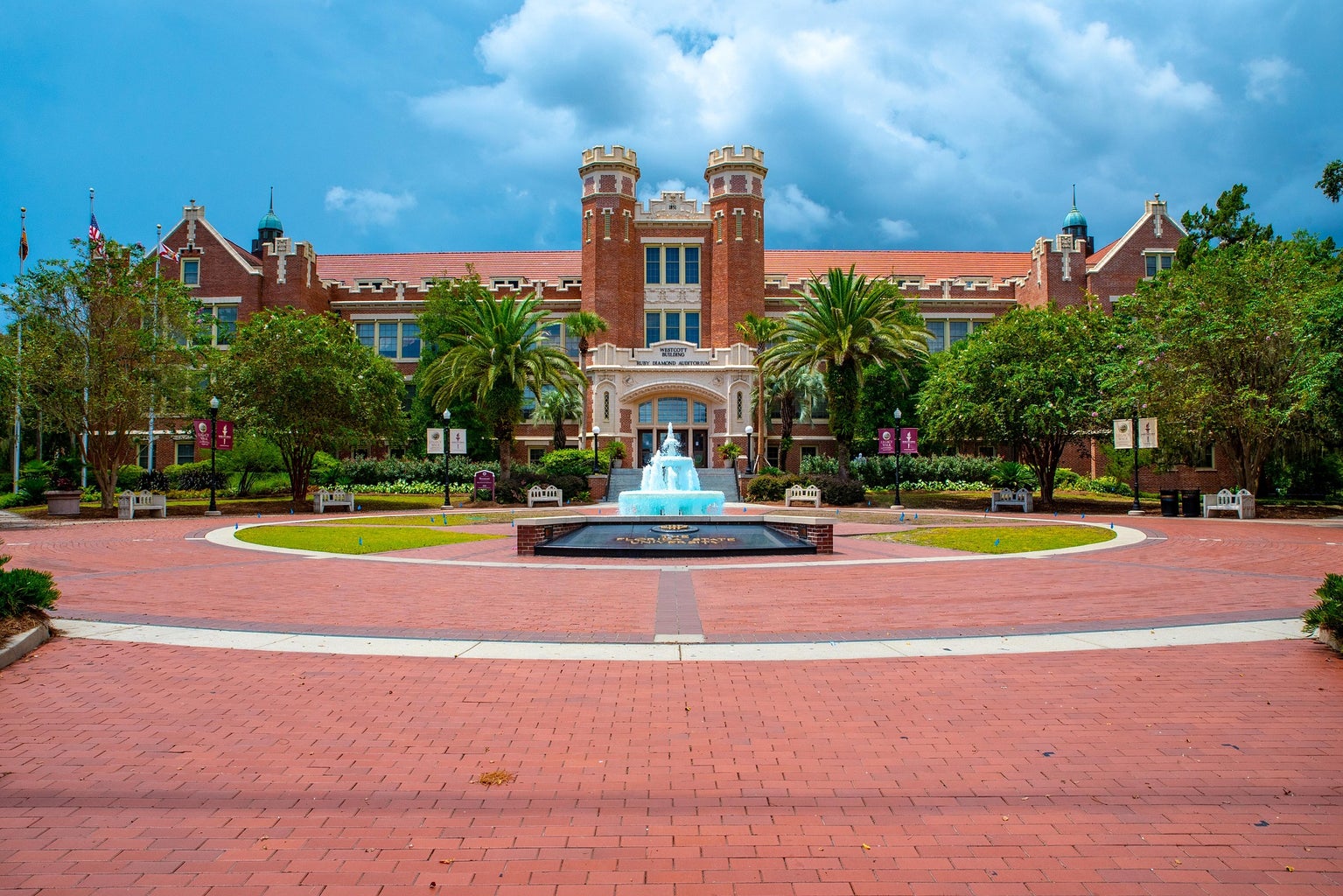Second-year Florida State University (FSU) graduate student Audrey Ashburn has been hard at work preparing undergraduate students for life after college. Not only is she instructing leadership learning, but she is also registering eligible student voters as a catalyst for social justice.
Her Campus (HC): What are all of the organizations you are a part of?
Audrey Ashburn (AA): With the Center for Leadership and Social Change, I am a graduate assistant, so I help Eric (the program coordinator) out with all of his programs. I do everything involving leadership and civic engagement. I work with Leadership LOGIC, LeaderShape, the ACC Leadership Symposium, leadership fairs and a program called Leadership on Landis where we talk about a leadership theory and try to start some conversations about it. On the civic engagement side, I work with our student voting initiatives. We have a brand-new student organization called Get Out the Vote FSU all about trying to get people registered to vote and educated about all of the ballot items.
HC: How did you get involved with the Center for Leadership and Social Change?
AA: I work there. I am in the master’s program for higher education and student affairs. We all have graduate assistantships, so we all have positions in an office somewhere around the university. I did leadership studies during undergrad, so it was a perfect fit to move right into leadership education. I interviewed for my favorite position with the Center and I got it, which was amazing! It made me want to come here for my master’s degree.
HC: What are your day-to-day responsibilities with the Center for Leadership and Social Change?
AA: A lot of emails. I think that is the biggest thing in Student Affairs and higher education in general. I work in communications, make surveys and do assessments to make sure our programs are running well. I do a lot of advertising for our programs every day, along with curriculum building for the leadership programs. I have student meetings every week with all of my organizations, which is definitely the highlight of my week.
HC: Why did you want to pursue leadership?
AA: During undergrad, I was a psychology major, and I thought, “I need something on top of this that matches my interests.” I loved leading student organizations, so I thought, “I have heard of the leadership studies minor.” I thought that would be a great way to learn more about what I’m doing and use it for my resume. I wanted to learn about the theory behind it, so I started taking classes and I loved them. I was a TA for one of them. I met my mentor who guided me here to Florida State and told me I could focus a little more on leadership and get another degree in it, in something very similar [to psychology], and continue my work. I then found my path here. I love leadership studies because it explains a lot of things you might know or might be instincts to you but then it enhances them. It ensures that you are hearing all the voices in the room, supporting people properly and getting to a completed goal but also growing as a group on your way to that goal. I just really loved the theories and kept going.
HC: What do you plan to do after grad school?
AA: I am applying for jobs right now. My goal is to work somewhere in a university in the country, I just don’t know where. I would love to continue in leadership, so being a leadership program coordinator or working in an LGBTQ+ center would be my ideal position. I do the Allies and Safe Zones Screenings so I would love to continue to do that, or anything DEI (diversity, equity and inclusion) or academic advising, which is why I did this master’s program. I wanted to be an academic advisor badly. I love finding people’s strengths and talents, learning about them and guiding them to their end goals. That’s my serious goal, so we’ll see if I can get there and ultimately work somewhere in a university.
HC: Why do you think leadership learning is important for college students?
AA: With anything that you are going to do after college, you are going to be a leader or led by someone else and you always want to have the skills to make a group work together well. You want to see if you can guide people to where they are supposed to go. Leadership studies and an understanding of leadership theory are great ways to get there because you know what you could be doing wrong if something is not going great. As a subordinate, you know how you can better support your leaders and everyone toward a common goal. Leadership is never going away in anyone’s life, especially with everything so globalized, connected and team-oriented; it is going to be around forever so we might as well learn about it.
HC: Has the pandemic changed leadership and leadership learning? How so?
AA: Absolutely. We struggled a lot last year during the pandemic with leadership programming because it is such an in-person, hands-on learning experience. We tried to transition things to be remote and online. The content comes across, but you can’t see it in action as well until you are in person. It was a challenge, but it pushed us to reconsider what leadership looks like in a remote setting. You need to trust that the people you are working with are going to absorb the information. People need to trust that you are not going to waste their time. It shifted the way we had to think about things and the emphasis on if our programming is not working online, then we need to shift what we think leadership is.
HC: How have you seen leadership evolving in recent years and in the future?
AA: I’ve seen a bigger social justice emphasis. It’s great because one of the most recognized theories in the leadership world was created at Florida State. It is called Culturally Relevant Leadership Learning theory and it guides leadership educators to make sure that their content is socially just, and that they are educating in an accessible way. Leadership was once something created for White men. Now, we are labeling things that are actually leadership that we might have previously labeled as service for other groups that are not White men. For example, a lot of people label what Stacey Abrams does as service, but it is leadership. I think everything is changing with how we view that.
If you are interested in getting involved in the Center for Leadership and Social Change, click here.
Want to see more HCFSU? Be sure to like us on Facebook and follow us on Instagram, Twitter, TikTok, YouTube and Pinterest!



